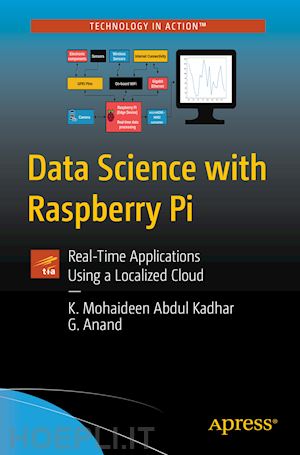

Questo prodotto usufruisce delle SPEDIZIONI GRATIS
selezionando l'opzione Corriere Veloce in fase di ordine.
Pagabile anche con Carta della cultura giovani e del merito, 18App Bonus Cultura e Carta del Docente
Implement real-time data processing applications on the Raspberry Pi. This book uniquely helps you work with data science concepts as part of real-time applications using the Raspberry Pi as a localized cloud.
You’ll start with a brief introduction to data science followed by a dedicated look at the fundamental concepts of Python programming. Here you’ll install the software needed for Python programming on the Pi, and then review the various data types and modules available. The next steps are to set up your Pis for gathering real-time data and incorporate the basic operations of data science related to real-time applications. You’ll then combine all these new skills to work with machine learning concepts that will enable your Raspberry Pi to learn from the data it gathers. Case studies round out the book to give you an idea of the range of domains where these concepts can be applied.
By the end of Data Science with the Raspberry Pi, you’ll understand that many applications are now dependent upon cloud computing. As Raspberry Pis are cheap, it is easy to use a number of them closer to the sensors gathering the data and restrict the analytics closer to the edge. You’ll find that not only is the Pi an easy entry point to data science, it also provides an elegant solution to cloud computing limitations through localized deployment.
What You Will Learn
Who This Book Is For
Data scientists who are looking to implement real-time applications using the Raspberry Pi as an edge device and localized cloud. Readers should have a basic knowledge in mathematics, computers, and statistics. A working knowledge of Python and the Raspberry Pi is an added advantage.
Chapter 1: Introduction to Data Science.- Chapter 2: Basics of Python Programming.- Chapter 3: Introduction to Raspberry Pi.- Chapter 4: Sensors and Signals.- Chapter 5: Preparing the Data.- Chapter 6: Visualizing the Data.- Chapter 7: Analysing the Data.- Chapter 8: Learning From Data.- Chapter 9: Case Studies.











Il sito utilizza cookie ed altri strumenti di tracciamento che raccolgono informazioni dal dispositivo dell’utente. Oltre ai cookie tecnici ed analitici aggregati, strettamente necessari per il funzionamento di questo sito web, previo consenso dell’utente possono essere installati cookie di profilazione e marketing e cookie dei social media. Cliccando su “Accetto tutti i cookie” saranno attivate tutte le categorie di cookie. Per accettare solo deterninate categorie di cookie, cliccare invece su “Impostazioni cookie”. Chiudendo il banner o continuando a navigare saranno installati solo cookie tecnici. Per maggiori dettagli, consultare la Cookie Policy.